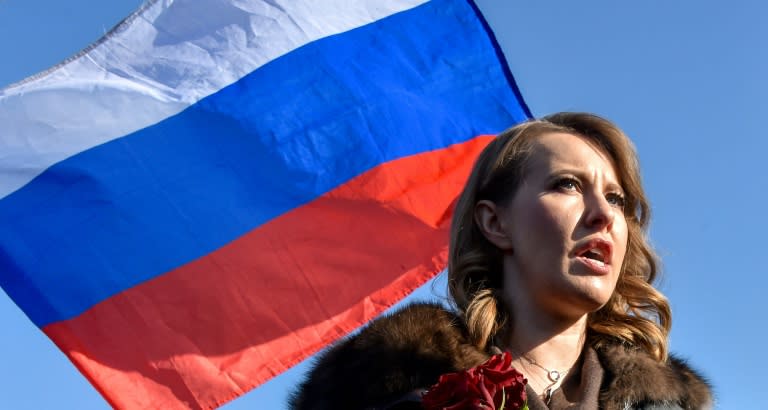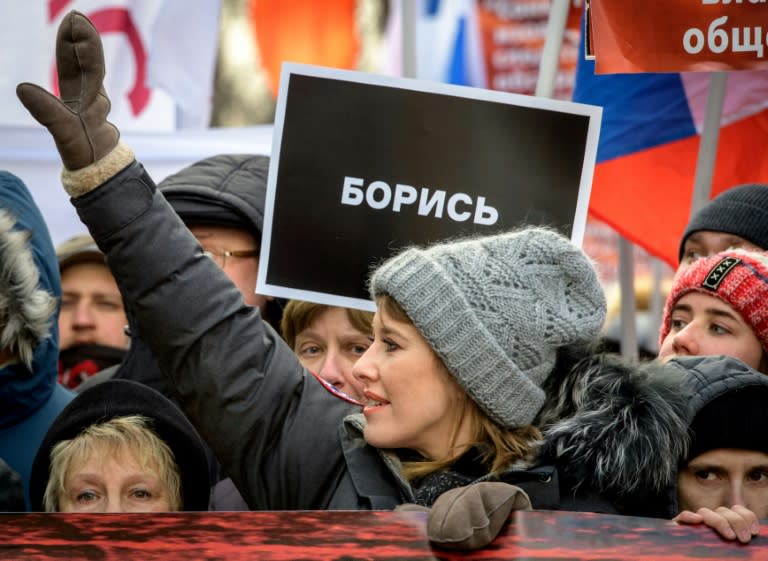Russia's glamour candidate looks beyond presidential poll
A symbol of Russia's gilded youth, detested by the majority of her countrymen, liberal candidate Ksenia Sobchak has little chance at the presidential poll this month but is hoping to use her candidacy as a political jumping-off point. When she announced she would run last year, the 36-year-old former socialite injected a rare element of surprise into an election that President Vladimir Putin is all but guaranteed to win with a landslide. Sobchak has faced accusations that she is a Kremlin stooge, designed to provide a veneer of glamour and the illusion of choice at the ballot box. But the one-time reality TV presenter, who in recent years has become an opposition journalist and combative interviewer, has used her platform in the campaign to deliver rare public rebukes to Putin. "This election is for me an opportunity to bring together everyone who is dissatisfied, to bring down in a mathematical manner Putin's score," she said at a recent press conference. Her aim is to prove that "there are many of us and we are against Putin, his politics and his election," she said. Some in the opposition, including Alexei Navalny -- who has some popular support but is barred from standing because of a criminal conviction he says was politically motivated -- have viewed Sobchak's candidacy with suspicion. These doubts stem from the fact that Sobchak's late father, Anatoly, was the liberal mayor of Saint Petersburg in the 1990s and was Putin's political mentor. "Whatever a person does in this country, he is accused (of having links to the Kremlin)," said Sobchak, who has made no secret of having told the president in advance about her candidacy. "I think (he) just decided: all right, let her do it, she's not going to cause any trouble," the candidate told the newspaper RBK. "I am used to people underestimating me." - TV fight - Over the course of the campaign Sobchak, who is mainly known to Russians for having presented the Big Brother-style reality TV show Dom 2, has travelled to all corners of the country in a bid to shake off her "it girl" image. She has jumped into a frozen pond in Siberia in temperatures of -40 degrees centigrade, used a wheelchair to navigate potholed pavements and even led a one-woman demonstration in Chechnya in support of arrested human rights activists. This week she hit headlines after pouring a glass of water over the ultranationalist presidential candidate Vladimir Zhirinovsky in an ugly spat during a televised debate. But the publicity is doing little to help her approval ratings: according to the official Russia Public Opinion Research Centre, 88 percent of Russians say they would "never" vote for her. "That just means I'm the best-known candidate," she told the press with a smile. Valeriy Fyodorov, head of the polling institute at the research centre, told AFP Russians would be unlikely to vote for someone with no direct political experience. "The ideal political (for Russians) is an experienced man," he said, explaining that Sobchak's gender would also harm her chances. Another major obstacle is Sobchak's pro-Western views -- she has called for better relations with Western powers, spoken out in support of LGBT rights and decried as "illegal" Russia's annexation of Crimea, which was widely supported at home. - 'A political force' - Sobchak is hoping to receive 3 percent of the vote, which would put her in fourth or fifth place, but the most recent opinion polls give her around 1 percent. "The support I receive in this election will allow me to form a movement and then in six years, a political force with which I will go into the next election," the candidate said. Fyodorov believes that if she can reach 3 percent there is a chance Sobchak could create her own political party. She is likely to do better in the polls than other liberal candidates Boris Titov, a representative of the Russian business community, or the Yabloko opposition party founder Grigory Yavlinsky, according to the pollster. Sobchak has promised to create "a broad opposition movement" in contrast to current fractured anti-Kremlin efforts, led by Alexei Navalny who is frequently harassed and jailed. "If I didn't put myself forward at these elections... it would have been business as usual but without any opposition," Sobchak has said.




